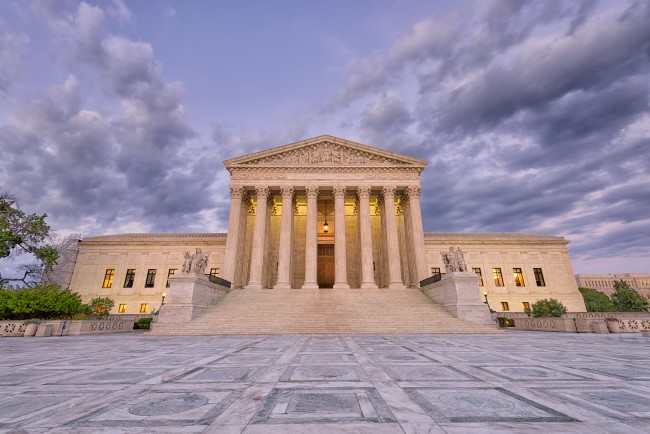-
 Read more
Read moreIt can be tough to wait for a judge to decide your motion. Lawyers and clients generally want a decision quickly, but sometimes that doesn’t happen.
A little-known law, though, might help you learn a bit more about when your next motion will be decided. Under the Civil Justice Reform Act of 1990, 28 U.S.C § 476, judges must report motions that have been pending for more than six months twice a year: once on March 31 and again on September 30. Generally, a motion is considered pending 30 days after it is filed.1
-
 Read more
Read moreThe Supreme Court’s recent decision in Ford Motor Company v. Montana Eighth Judicial District Court, 141 S. Ct. 1017 (2021), is the latest entry in the Court’s rulings on personal jurisdiction, and may force lower courts to reevaluate jurisdictional tests that have required a plaintiff to show that a defendant’s actions in the forum state had a causative link to the plaintiff’s claims.
-
 Read more
Read moreMaryland is harsh on lawyers who commit dishonest acts. Since Attorney Grievance Commission v. Vanderlinde, 773 A.2d 463 (Md. 2001), the Court of Appeals has stated many times that the presumptive sanction for dishonest acts is disbarment. To oversimplify, the Court reasons that lawyers who commit dishonest acts are dishonest lawyers and therefore cannot be entrusted with client matters.
-
 Read more
Read moreTo clarify a long-running, hotly-litigated question regarding when a new drug qualifies for exclusive marketing rights intended to reward innovation, Congress has taken an important step toward amending the Federal Food, Drug, and Cosmetic Act (FDCA).
-
 Read more
Read moreIn October 2019, the Maryland State Bar Association’s Committee on Ethics published an opinion discussing a Maryland attorney’s duty to report the unauthorized practice of law by a non-Maryland attorney. A footnote to the opinion states:
It is worth noting that other jurisdictions have self-reporting requirements for licensed attorneys who are disciplined for violations of rules of professional conduct in other jurisdictions. See, Rule 8.3 of the Virginia Rules of Professional Conduct. Maryland does not impose a similar obligation on its attorneys.
-
 Read more
Read moreNow more than ever, we are aware of the close interplay between mental and physical health. Historically, our health care system has too often turned a blind eye to mental health conditions—simply treating and providing coverage for physical ailments and sending patients on their way. Health insurance companies both reflected and exacerbated this problem, providing no or wholly inadequate coverage for mental health services. The 2008 passage of The Paul Wellstone and Pete Domenici Mental Health Parity and Addiction Equity Act—commonly known as the Parity Act—was a giant leap forward in outlawing discrimination by insurers against mental health services. Under the Parity Act, if a health plan covers both medical/surgical conditions and behavioral health conditions (i.e., mental illnesses or substance use disorders), it must provide benefits for both types of conditions “at parity” – that is, on an equal basis. This means, for example, if a plan covers routine outpatient services in a doctor’s office to treat medical conditions like strep throat, it must also provide comparable coverage for outpatient services in a therapist’s office for treatment of depression or an opioid addiction.
-
 Read more
Read moreOn March 22, 2021, the SEC launched a new page on its website to collect agency actions and resources about climate and environmental, social, and governance (ESG) issues in investing. This is the latest in a series of initiatives by the Commission signaling that climate and ESG disclosures—that is, the information asset managers and public companies provide to investors about their ESG-related risks and opportunities—will take center stage as the Commission adapts to the priorities of the Biden administration. Investors increasingly look to a company’s ESG impact or whether a fund follows ESG criteria to inform their investing decisions. Similarly, many younger consumers rely upon ESG factors to guide their purchasing choices. The lack of a standardized ESG framework makes it difficult for investors and other stakeholders to make “apples to apples” evaluations of a company’s or fund’s ESG practices.
-
 Read more
Read moreDiscrimination doesn’t just include refusing to hire someone based on a protected characteristic, such as race or gender. Harassment based on a protected characteristic can also give rise to a discrimination claim, if the harassment is “severe or pervasive enough” to create a hostile work environment.
Even before the COVID-19 pandemic, the number of employees working from home was skyrocketing. But now, that trend has accelerated even faster. This raises the question: can an employee suffer from a hostile work environment—while working from home?
-
 Read more
Read moreThe coronavirus pandemic has already had a massive impact on businesses. Many companies have announced layoffs, furloughs, or unpaid leaves of absence.
Employers aren’t prohibited from firing employees. Employment relationships are usually at-will, meaning that employees can be fired for any reason or no reason at all. Of course, there are still boundaries that apply, such as laws prohibiting discrimination and retaliation.
-
 Read more
Read moreThe recent coronavirus outbreak raises a host of employment-law issues. For example, the Occupational Safety and Health Act requires employers to take measures to eliminate or reduce dangerous hazards to their employees. The Family and Medical Leave Act mandates leave for “serious health conditions,” raising questions as to whether an infected employee is legally entitled to leave. And Title VII of the Civil Rights Act prohibits discrimination based on national origin, so an employer can’t tell someone not to come to work just because he or she is from China or Italy.
As the regulatory and business environments in which our clients operate grow increasingly complex, we identify and offer perspectives on significant legal developments affecting businesses, organizations, and individuals. Each post aims to address timely issues and trends by evaluating impactful decisions, sharing observations of key enforcement changes, or distilling best practices drawn from experience. InsightZS also features personal interest pieces about the impact of our legal work in our communities and about associate life at Zuckerman Spaeder.
Information provided on InsightZS should not be considered legal advice and expressed views are those of the authors alone. Readers should seek specific legal guidance before acting in any particular circumstance.
Contributing Editors

John J. Connolly
Partner
Email | +1 410.949.1149

Andrew N. Goldfarb
Partner
Email | +1 202.778.1822

Sara Alpert Lawson
Partner
Email | +1 410.949.1181

Nicholas M. DiCarlo
Associate
Email | +1 202.778.1835




